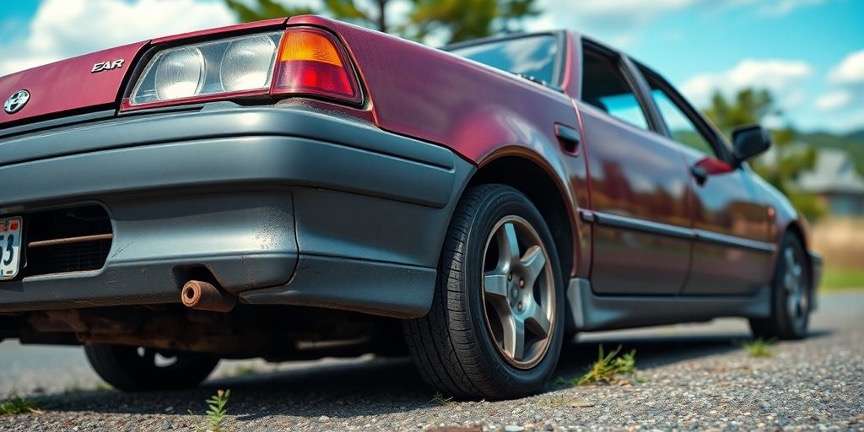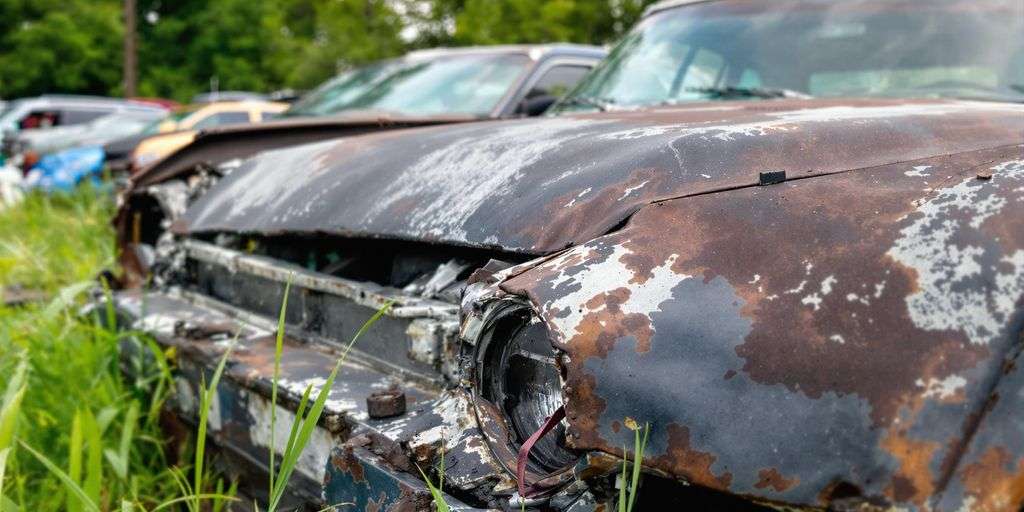Key Takeaways
- Research your state's specific laws about selling junk cars to avoid any legal issues.
- Consult your local DMV for guidelines on what documentation is required for the sale.
- Prepare your car for sale by cleaning it and gathering all necessary documents.
- Explore different selling options and evaluate buyer reputations before finalizing a deal.
- Ensure you handle the transfer of ownership and disposal of hazardous materials properly.
Understanding Local Regulations for Selling Junk Cars
Researching State-Specific Laws
Selling a junk car isn't just about finding a buyer; you need to be aware of the rules that apply in your state. Each state has its own set of laws about how you can sell a junk car. It's super important to know these before you start the selling process. You can start by checking out your state's Department of Motor Vehicles (DMV) website or contacting them directly. They can provide you with the latest info on selling junk cars legally.
Consulting Local DMV Guidelines
The DMV is your go-to for understanding what you need to do to legally sell your junk car. They can tell you about the necessary paperwork, like the title and bill of sale, and any fees that might be involved. It's also a good idea to check compliance and licensing requirements if you're dealing with valuable metals or other materials that might have additional regulations.
Identifying Required Documentation
When you're ready to sell, make sure you have all your documents in order. You'll need things like the car title, bill of sale, and possibly proof of insurance. Some states might also require a smog certificate or other specific documents. If you're missing the title, don't panic. Some states offer ways to sell without it, like applying for a duplicate title or providing a notarized bill of sale. Having the right documents will make the sale smooth and legal.
Getting everything sorted out with the DMV and understanding state laws might seem like a hassle, but it's worth it to avoid any legal issues down the road.
Preparing Your Junk Car for Sale

Cleaning and Presenting Your Car
Getting your junk car ready for sale starts with cleaning it up. A clean car is more appealing and can even bump up its perceived value. Here’s what you should do:
- Remove Personal Items: Check every nook and cranny—glove compartment, trunk, under the seats. You don’t want to accidentally sell your favorite sunglasses.
- Thorough Cleaning: Give it a good wash and vacuum. Use upholstery cleaner for the seats and glass cleaner for the windows. A little elbow grease goes a long way.
- Tidy Up the Exterior: Consider a quick wax job to make it shine. Even if it’s headed for the junkyard, a little shine can make a difference.
Taking the time to clean your car not only makes it more attractive but also shows potential buyers that you’ve cared for it, even in its final days.
Gathering Necessary Documents
Having all your paperwork in order is crucial when selling your junk car. Here’s what you need:
- Car Title: This proves you own the car. If it’s lost, get a duplicate from your local DMV.
- Bill of Sale: This document records the sale and includes details like the buyer and seller info, VIN, and sale price.
- Maintenance Records: These can show potential buyers that you’ve taken care of the car, possibly increasing its value.
Assessing the Car's Condition
Before you sell, you need to know what you’re dealing with:
- Overall Condition: Look over the exterior and interior for damage, rust, or missing parts.
- Working Parts: Identify any parts still in good shape, like the engine or transmission, which might be worth more.
- Market Research: Check online listings to see what similar junk cars are going for. This will help you set a fair price.
By following these steps, you’ll be better prepared to sell your junk car and potentially get more money for it. For more insights on selling, check out this guide on obtaining cash for junk cars.
Finding the Right Buyer for Your Junk Car
Exploring Different Selling Options
When you're ready to part ways with your junk car, you’ve got a few paths to consider. You can go the private sale route, which might take longer but could fetch a higher price. On the flip side, junkyards offer quick sales, but they might not give you top dollar. Then there are companies that specialize in buying junk cars, often striking a balance between convenience and price. Weighing these options carefully will help you find the best fit for your needs.
Evaluating Buyer Reputation
Not all buyers are created equal, so it's important to check out who you’re dealing with. Look for reviews and testimonials from other sellers to get a feel for their experiences. It might also be worth checking if the buyer is licensed and follows local regulations. Trustworthy buyers will make the process smoother and more straightforward.
Negotiating the Best Price
Once you’ve got a buyer in your sights, it’s time to haggle. Be ready with details about your car’s condition and any market research you’ve done. Don’t be shy about countering an offer if it feels too low. Remember, negotiation is about finding a middle ground where both parties walk away satisfied.
Selling your junk car doesn't have to be a headache. By exploring your options, doing a bit of homework on buyers, and being prepared to negotiate, you can find the right buyer and walk away with cash in your pocket.
Handling Legal and Environmental Responsibilities
Proper Disposal of Hazardous Materials
Selling a junk car isn't just about the transaction; it's also about being responsible with what's inside the car. Many junk cars have hazardous materials like oil, gasoline, or even refrigerants. It's important to get these things disposed of properly, so they don't harm the environment. Some junkyards offer services to handle these materials, making it easier for you. You might want to check with them to see if they can help with this part of the process.
Transferring Ownership Legally
When selling your junk car, transferring ownership is a big deal. You need to make sure the title is correctly passed on to the buyer or the junkyard. This means filling out a bill of sale and notifying the Department of Motor Vehicles (DMV) about the sale. This step is crucial to avoid any future liabilities that might arise if the car is still registered under your name. Without this, you could still be on the hook for things like parking tickets or accidents the car gets into after it's sold.
Meeting Environmental Regulations
Aside from handling hazardous materials, there are other environmental regulations you need to be aware of. Different states have different rules about what needs to be done when you sell a junk car. Some might require you to remove certain parts before selling, while others might have specific recycling requirements. It's a good idea to familiarize yourself with these regulations to make sure you're not violating any laws. This way, you can sell your junk car without any legal hiccups.
Taking care of the legal and environmental aspects of selling a junk car might seem like a hassle, but it's necessary. Not only does it protect you legally, but it also helps keep the environment safe. By handling these responsibilities, you're doing your part to ensure that the sale of your junk car is completed smoothly.
For more information, remember to check additional guidelines outlined in 41 CFR parts 101-42 and 101-45 of the Federal Property Management Regulations, which must be followed for the sale of personal property.
Maximizing the Value of Your Junk Car

Understanding Market Trends
To get the most cash for your junk car, it's smart to know what's happening in the car market. Prices can change based on demand for scrap metal or parts. Check online resources or talk to local junkyards to get a feel for current prices. Staying informed about market trends can help you decide the best time to sell your junk car.
Getting Multiple Quotes
Before jumping into a sale, reach out to several buyers for quotes. This could be junkyards, private buyers, or companies that specialize in buying junk cars. By comparing offers, you can make sure you're getting the best deal. Here’s a simple way to look at it:
| Buyer Type | Pros | Cons |
| Private Buyers | Higher prices possible | Takes more time |
| Junkyards | Quick and easy sale | Lower prices |
| Specialized Companies | Balance of price and convenience | May require more paperwork |
Highlighting Valuable Parts
Your car might be a junker, but it still has parts that can be worth something. Identify any parts that are still in good condition or have been recently replaced. When you're talking to potential buyers, make sure to mention these. Emphasizing valuable components can bump up the price you get for your car.
Keep in mind, selling a junk car is not just about getting rid of it. It's about making the most out of what you have left. By knowing the market, shopping around, and showcasing what’s still good in your car, you can turn your junk car into a decent payday. If you're considering other options, remember that donating your vehicle can be a hassle-free alternative with benefits like free towing.
Navigating the Sale Process Smoothly
Communicating with Potential Buyers
Selling your junk car starts with reaching out to potential buyers. Clear communication is key. When you get inquiries, respond promptly and provide all necessary details about the car, such as its condition, any paperwork you have, and your asking price. Be honest about any issues the car might have; transparency builds trust.
- Respond quickly to inquiries to keep buyers interested.
- Provide detailed information about the car's condition.
- Be upfront about the price and any non-negotiable terms.
Finalizing the Sale Agreement
Once you've found a buyer, it's time to seal the deal. Draft a bill of sale that includes all crucial details like the sale price, vehicle details, and both parties' information. Make sure both you and the buyer sign this document. If you don't have the title, consult your local DMV for alternative proof of ownership.
- Prepare a detailed bill of sale.
- Ensure both parties sign the document.
- Provide alternative ownership proof if the title is unavailable.
Before handing over the keys, double-check that all paperwork is completed correctly. This step prevents future headaches.
Reporting the Sale to Authorities
After the sale is complete, notify your local DMV to avoid future liabilities. This involves submitting the bill of sale and any required forms to them. This step is crucial to ensure you're no longer linked to the vehicle in any official capacity.
- Submit the bill of sale to the DMV.
- Provide any additional required forms.
- Confirm that the DMV has updated their records to reflect the sale.
For more detailed guidance, consider selling a car to a junkyard, which involves specific steps and notifications to the DMV. Understanding these processes ensures a smooth transaction and peace of mind.
Benefits of Selling to a Junkyard
Quick and Hassle-Free Process
Selling your junk car to a junkyard is one of the easiest ways to get rid of an unwanted vehicle. You don't have to worry about creating listings or dealing with potential buyers who might flake out at the last minute. The simplicity of the process is a major draw; most junkyards offer to pick up the car directly from your location, saving you the headache of arranging transportation.
Environmental Benefits
Junkyards are equipped to recycle and dispose of car parts in an eco-friendly way. When you sell your car to a junkyard, you're not just getting rid of a clunker; you're also contributing to recycling efforts. This helps reduce waste and supports the reuse of materials, which is a win for the planet.
Immediate Cash Payment
One of the most attractive benefits of selling to a junkyard is the immediate payment. Unlike other selling methods that may involve waiting for a check to clear or a buyer to finalize a loan, junkyards pay you cash on the spot. This can be particularly handy if you need quick cash for other expenses.
Selling your junk car to a junkyard offers several advantages, including earning cash, freeing up space, and contributing to recycling efforts.
- No need for advertising or negotiating
- Minimal paperwork involved
- Quick removal of the vehicle from your property
For those looking to sell their junk car, junkyards provide a straightforward, efficient solution.
Wrapping It Up
So, there you have it. Selling a junk car might seem like a mountain to climb, but with the right steps, it's more like a hill. Start by getting your paperwork in order, because nobody likes a messy sale. Clean up your car a bit, even if it's headed for the scrap heap—first impressions count, right? Then, do your homework on local junkyards or buyers. A little research can go a long way in getting you a better deal. And don't forget to check out the local regulations; you don't want any surprises down the road. Once you've got everything lined up, selling your junk car can be a breeze. Just take it one step at a time, and you'll be cashing in on that old clunker before you know it.
Frequently Asked Questions
What paperwork do I need to sell my junk car?
You'll need the car's title, registration, and possibly a bill of sale. Check your state's requirements for any additional documents.
Can I sell my junk car without a title?
Selling without a title can be tricky. Some states allow it with a bill of sale or other proof of ownership. It's best to check local laws.
How do I find a buyer for my junk car?
You can sell to a junkyard, an online car buyer, or a local scrap dealer. Research to find the best option for you.
Do I need to clean my junk car before selling?
While not required, cleaning your car can make it more appealing and might help you get a better price.
What should I do with my car's license plates?
Remove the plates before selling and return them to your local DMV to cancel the registration.
How can I get the best price for my junk car?
Get quotes from multiple buyers, know your car's condition, and highlight any valuable parts to negotiate a better price.



